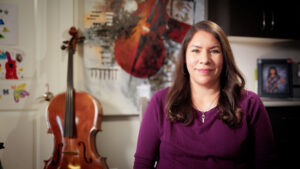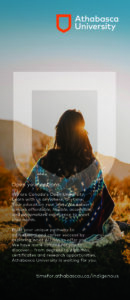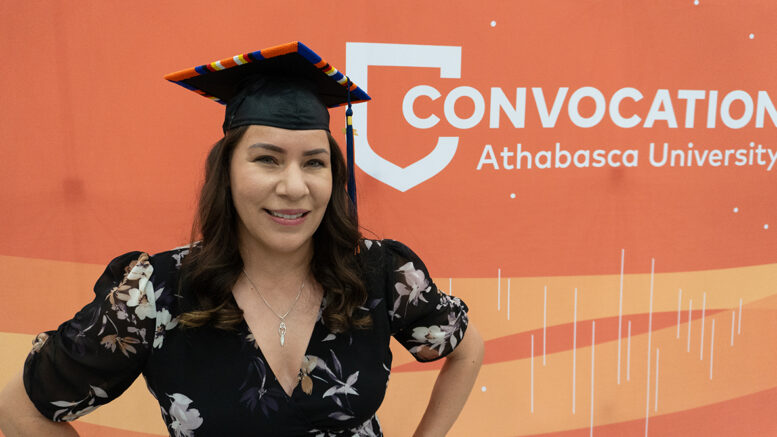Athabasca University (AU) is committed to making education more accessible, no matter where you live, work, or learn from. With a mission to remove barriers and open doors, AU provides flexible programs and support services designed to help every learner succeed.
Kethra Stewart is an Indigenous scholar, musician, triathlete, and role model to her daughter.

Kethra Stewart is a musician, scholar, triathlete and a role model to her daughter.
Every morning for the past five years, Kethra Stewart (Master of Health Studies ’25) has woken at 6:30 a.m. to make breakfast and pack lunch for her daughter, Keira, before rushing out the door to make the daily school drop-off. Once the school bell rings and goodbye hugs are exchanged, Stewart shifts focus from full-time mom to full-time university student.
“When she’s at school, I’m at my desk. Even after she goes to bed, sometimes I’m up until 11 or 12 o’clock at night working,” she says.
When she wasn’t studying, the single mom from Saddle Lake Cree Nation who now lives in Kelowna, B.C., was likely busy with other family activities such as teaching Keira cello—a lifelong passion she’s proud to share—or shuttling to and from swimming lessons, ballet, powwow dances, or kung fu. On top of it all, Stewart trains as a triathlete.
In other words, the days are full and evenings are long, but she wouldn’t have it any other way as she strives to create the best life possible for the family. And Athabasca University (AU) played a big role in making it happen.
“I’m the first of my family to get a degree. I’m the first of my family to do a master’s degree, to be brought up in both Western views and also learning the Indigenous Worldview,” Stewart says.
Everything Stewart has achieved, including her recent Master of Health Studies degree from AU, would be unrecognizable to her younger self. The decades in between have been marked by healing and self-discovery, including a reconnection with her Indigenous roots, and gaining knowledge to help ensure that Indigenous People have access to timely, culturally safe health care.
In search of self
Stewart is one of three children, but she was separated from her birth family at six months old and placed with a foster family and later adopted. She grew up in the Edmonton region as an only child and excelled in music, especially cello, which she started playing at age three.
During her early teens, she started struggling with self-identity and turned to drugs and alcohol to “mask how I was feeling.” The road to recovery wasn’t easy, but she persevered and eventually went back to school and became an emergency medical responder, later upgrading to become an emergency medical technician.
Stewart’s interest in health care grew, and she earned a health-care aide certificate and later a diploma in massage therapy. By 2017, Stewart decided to build on her education and pursue a bachelor’s degree in health sciences.
 Rediscovering Indigenous Knowledge and Traditions
Rediscovering Indigenous Knowledge and Traditions
Two years later, Stewart and Keira moved to the British Columbia interior where they started exploring their heritage, attending powwows, meeting Elders, raising awareness of missing and murdered Indigenous women and girls, and joining The Women of Turtle Island.
“I’ve been really blessed to meet a lot of people along the way who have helped us and inspired us to become part of this community.”
The combination of worldviews—Two-Eyed Seeing—also influenced Stewart’s education. She started learning about Indigenous health, health policy, and health promotion during the final year of her bachelor’s degree and decided to make that the focus of her research at AU through the Master of Health Studies program.
Working to improve health care for Indigenous People
In addition to the flexibility of online learning, which allowed her to study and raise a child, one of the appeals of the thesis program was that she could choose a research topic that combined her life experiences as an Indigenous woman but also 20 years of professional experience in health care. Her research focuses on Indigenous health and health equity to improve cultural safety training among all health professions, particularly in massage therapy.
“There are a lot of inequities happening still within hospitals, clinical settings, even massage therapists, pharmacists, acupuncturists, and holistic providers. The more I looked into that, I found that a lot of people aren’t even aware.”
Stewart credits AU and the Master of Health Studies program for providing opportunities to engage with Indigenous communities, especially when it came to her capstone project—the culmination of two years of research into health equity and promotion.
The work can’t—and won’t—stop. Thanks to her master’s experience at AU, Stewart hopes to take another step academically and professionally by going to medical school.
Through it all, Stewart’s inspiration to succeed continues to be Keira.
“I knew that if I just applied myself, I could get the highest education possible. And here I am getting a master’s degree. It’s crazy. It’s unbelievable. It’s amazing. I’m very blessed and very grateful.”
Your future can start here. Learn more about AU’s programs, flexible online study options at athabascau.ca



Be the first to comment on "AU Grad rediscovers Indigenous roots, becomes first in her family to earn a degree"